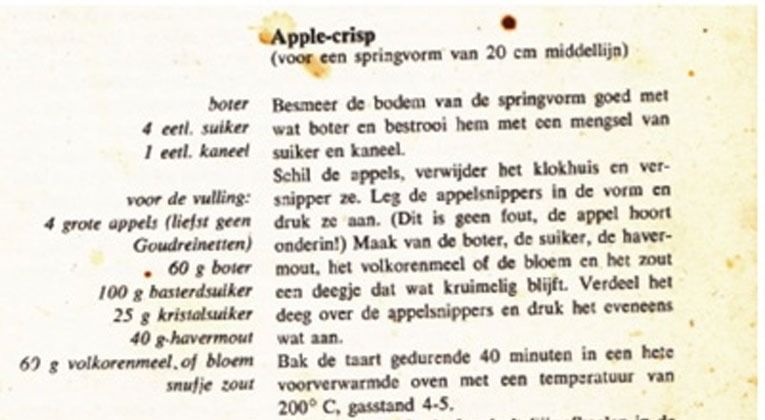Consumer research – what determines food satisfaction?
In a recent study, Barbara Andersen and Grethe Hyldig from the National Food Institute of Denmark zoomed in on food satisfaction from a consumer perspective.
Posted by
Published on
Tue 17 Nov. 2015
Topics
| Consumer Behavior | Eating Behavior | MediaRecorder | Labs | Video Observation |

My mother makes the best apple crumble. The top is crunchy, the apples warm and mushy (but not too mushy!), and the level of cinnamon is in perfect balance with the sugar and the apples.
Honestly, I’ve never tasted a more delicious apple crumble, which sets a high standard for friends or restaurants offering me an apple crumble dessert.

Expectations and desires - consumer behavior & emotions
Today’s blog is about expectations and desires.
In a recent consumer research study, Barbara Andersen and Grethe Hyldig from the National Food Institute of Denmark honed in on food satisfaction from a consumer perspective. You’ll learn, as the researchers did, that expectations and desires based on memories play a very important role in determining the level of food satisfaction (as with my mom’s apple crumble).
Gaining insight
Barbara Andersen and Grethe Hyldig set up a study using two focus groups (a total of 20 consumers), varying in age, gender, employment level, and food interest (participation/interest in food related household activities).
The goal for Andersen and Hyldig was to gain insight into what determines levels of food satisfaction for different consumers. With particular knowledge about influencing factors, the food industry can develop products that meet or even surpass consumers’ needs and wishes.
The focus groups were organized at the National Food Institute at the Danish Technical University. In the 90 minute focus group sessions, participants were asked questions related to their experience of food satisfaction while eating, and which factors they would identify as important for the feeling of satisfaction. All sessions were recorded using Media Recorder software.
During the sessions, photos of lunch dishes were presented in order to get the discussion going. As the discussions continued, participants’ dialogues progressed further towards associations instead of discussing the exact dishes in the pictures.
All video recordings were repeatedly reviewed, and quotes were pulled and transcribed to illustrate themes.
Main themes identified were:
- Sensory properties
- Physical well being
- Expectations and desires (the apple crumble again)
- The food context
- Comparison of the importance of the various determinants to satisfaction.
Sensory variation
In general, Andersen and Hyldig conclude that sensory experience seemed to be the primary determinant of food satisfaction. For example, they found that some participants stated that both during and in between meals, they were primarily looking for sensory variation.
According to Andersen and Hyldig, this need for variation leads back to an innate need to ensure intake of an adequate amount of varied nutrients.
Furthermore, the results indicate that consumers desire a positive sensory experience,
but what makes the sensory experience is subjective…
bad news for the food industry, who would love to find an exact recipe or ingredient!
Memories about eating food in a particular Italian restaurant
Andersen and Hyldig also found that before intake, the most important factors were expectations and desires based on memories about previous food experiences, and the context in which the food was perceived.
Take for instance my expectations when visiting my parents; I already know that I can look forward to a marvelous food experience! The context of a restaurant, according to the panel members, also raised the bar when talking about what is expected of the food. Imagine an Italian restaurant and you’ll already think about delicious home-made pasta primavera.
Feeling fulfilled
Physical wellbeing was mentioned as important for the feeling satisfied. Included in this was the experience of an appropriate energy level after intake.
Imagine eating something and not feeling fulfilled; I know that feeling quite well – 2hrs after you finished eating your fast food order! And then there is the famous after lunch dip, that happens in the early afternoon when you ate too much, or just too heavy of food. That is also not the kind of physical wellbeing consumers are after.
Sensory experience
In general, Anderson and Hyldig have shown us that the sensory experience seemed to be the primary determinant to satisfaction.
But what exactly does that mean?
It means that there are many factors influencing food satisfaction, with none truly standing out as most important. So if you want to gain more insight in food satisfaction, you as the food purveyor need to take multiple factors into consideration seeing that they all, no one more than the other, influence the level of satisfaction.
And that makes me think…maybe it isn’t just the delicious apple crumble, but the setting and memories it evokes when we sit down as a family to eat that crumble!
Reference
- Andersen, B.V.; Hyldig, G. (2015). Consumers’ view on determinants to food satisfaction. A qualitative approach. Appetite, 95, 9-16.
- Image by Randy Robertson (Own work) (CC BY 2.0)
Related Posts

Just the way I want it: a study on consumer experience in self-designing

How to increase attention in commercials for Gen-Z


